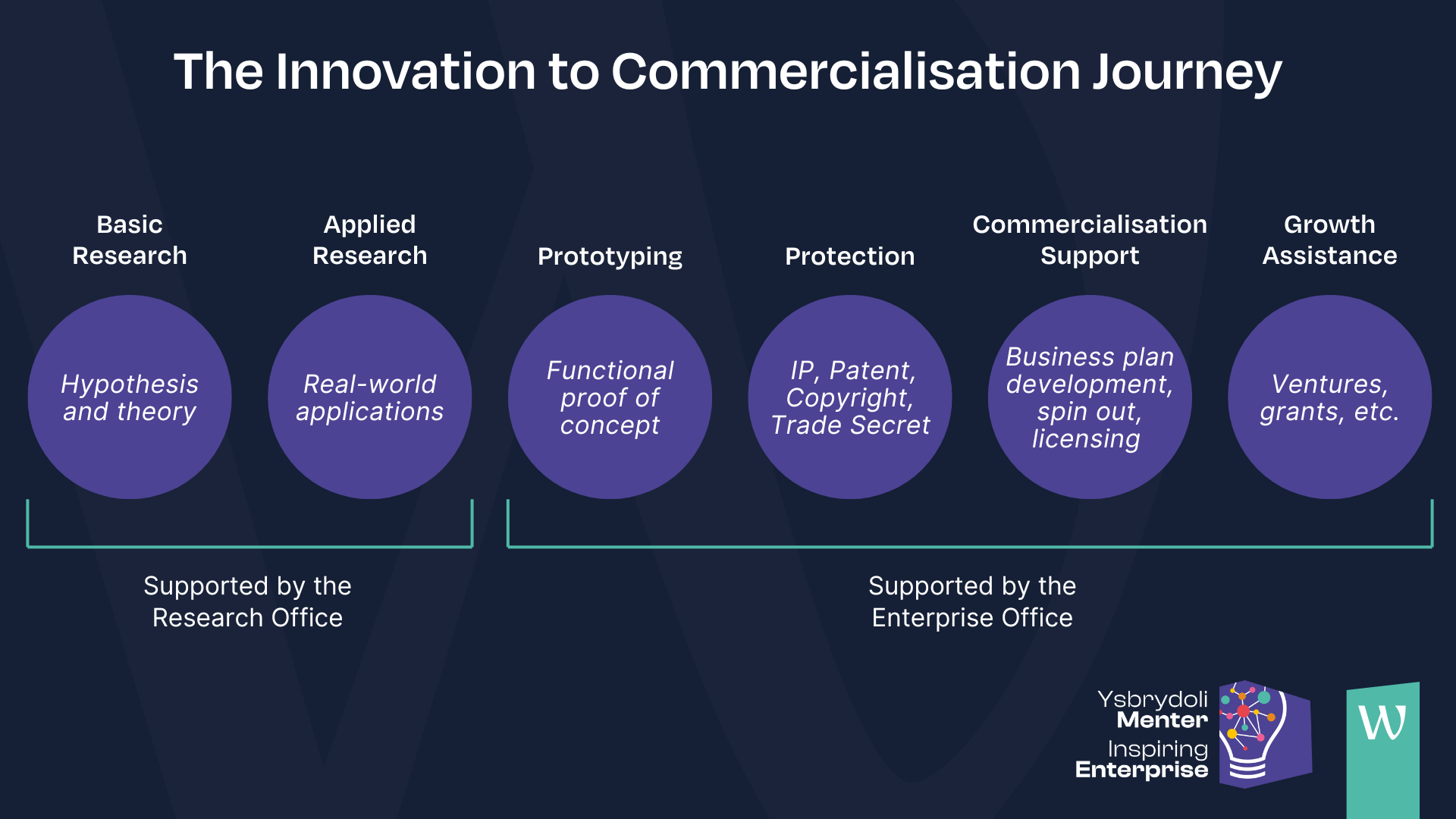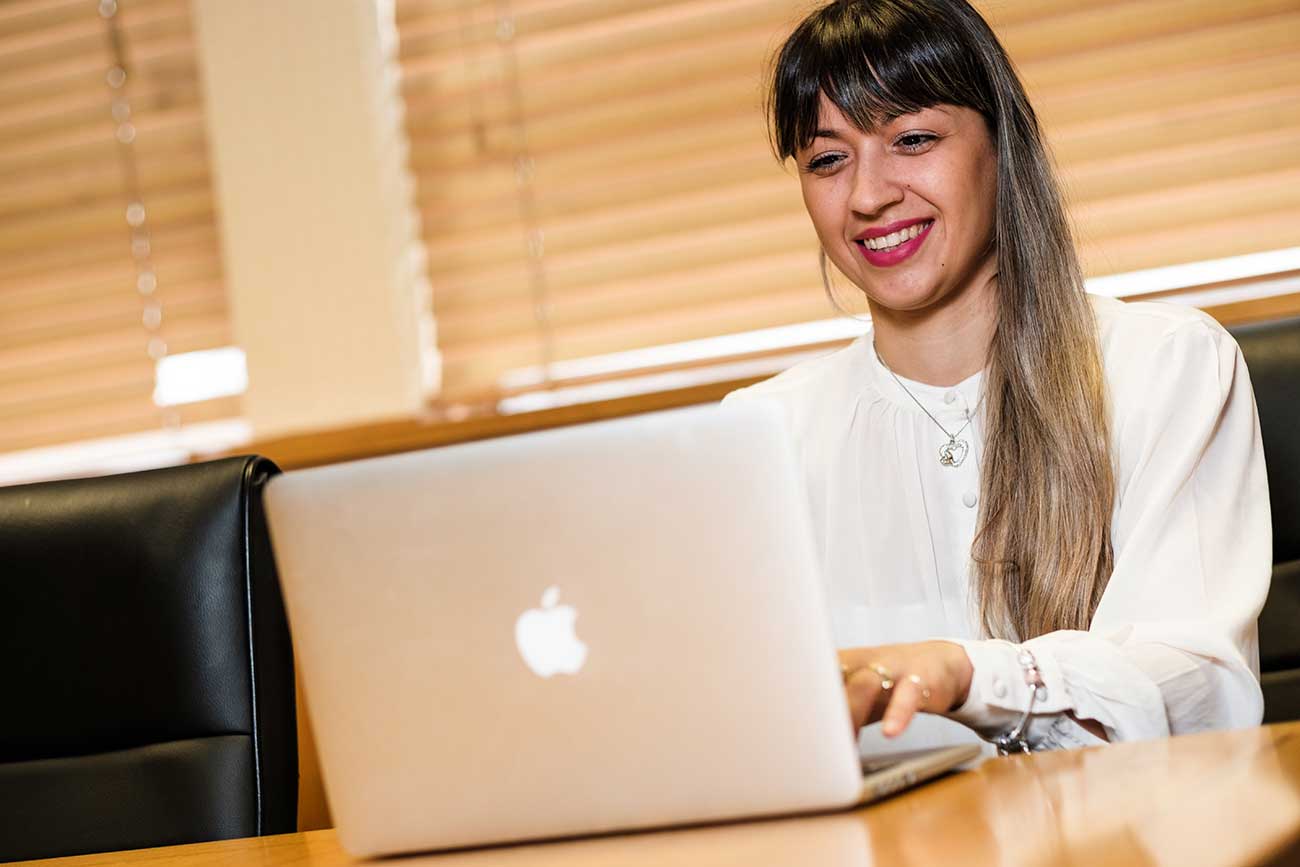
Resources for Academics
Wrexham University encourages commercial exploitation of research, therefore, early identification of Intellectual Property (IP) created in the University is vital. Creators should always be alert to the prospective value of their research.
Jump to:
Innovation Disclosure
Creators must notify the Enterprise Office immediately of any Intellectual Property that they believe may have commercial value arising from their University work (or that of their Students):
- In the course of their employment and/or the performance of their duties for the University; and/or
- Using University Resources; and/or
- In the course of duties falling outside of normal duties but specifically assigned to the member of Staff, prior to any public disclosure.
Any invention and associated information should be kept confidential until after a full evaluation by the Enterprise Office for exploitation potential and if appropriate, protection.
The University encourages publication but staff wishing to publish or otherwise disclose must first contact the Enterprise Office for a discussion regarding the most appropriate form of protection.
For all matters relating to Innovation Disclosure, please email enterprise@wrexham.ac.uk
Research to Commercialisation Support
The team are here to support academics throughout their Innovation to Commercialisation Journey. Although there are overlaps in support provided by both Research Services and Enterprise department, generally the first two stages of the journey are supported by the Research Office, whilst the remaining four stages are supported by the Enterprise Office.
More details on these journey stages are outlined in the infographic and information sections below:

Content Accordions
-
1. Basic Research
At this stage, you explore the initial concept of your idea. The focus is on formulating a hypothesis and working towards demonstrating the validity and potential value of your concept.
Common Funding Source(s): UK Research and Innovation (UKRI) Funds
Commercialisation Accelerator for STEM Disciplines: ICURe Engage – provides support in identifying potential users and beneficiaries through a high-level overview.
Commercialisation Accelerator for Social Sciences, Humanities, and Arts: Arc Accelerator Discover – provides a similar high-level overview of potential users and beneficiaries.
-
2. Applied Research
At this stage, you aim to verify whether the basic research findings can be practically applied in a laboratory setting, further testing your concept under controlled conditions.
Common Funding Source(s): UKRI Medical Research Council, European Innovation Council Pathfinder Grant
Commercialisation Accelerator for STEM: ICURe Discover – includes enhanced market awareness support along with £2,500 in funding.
Commercialisation Accelerator for Social Sciences, Humanities, and Arts: Arc Accelerator Launch – provides detailed customer and stakeholder analysis.
-
3. Functional Proof of Concept (Prototyping)
In this phase, the focus is on building prototypes and conducting performance trials to validate the functionality of your idea. The Enterprise team has strategic partners who may assist with creating prototypes required at this stage.
Common Funding Source(s): Wellcome Trust, Royal Academy of Engineering
Commercialisation Accelerator for STEM: ICURe Explore – support is provided for exploring technological applications and testing value propositions, with up to £35,000 in funding available.
Commercialisation Accelerator for Social Sciences, Humanities, and Arts: Arc Accelerator Accelerate – support includes the development of business models, with up to £62,500 in funding.
-
4. IP Protection
Although intellectual property (IP) protection can be implemented earlier or later, this stage is typically where full IP protection is pursued. Key forms of IP protection at this point include patents, design protection, copyrights, and trade secrets. Trademarks may also be considered once a company has been established on later stages of this journey.
Forms of protection under UK Intellectual Property Office (IPO):
- Patent: Protects new inventions by granting the holder exclusive rights to the invention for up to 20 years.
- Copyright: Safeguards original literary, artistic, and musical works, giving the creator control over its use and distribution.
- Trade Secret: Involves confidential business information that provides a competitive edge.
- Registered Design: Protects the unique visual appearance of a product.
Resources: We collaborate with our Legal team at Wrexham University, as well as our external legal partner Appleyard Lees, for patent and IP protections within the UK and internationally.
-
5. Commercialisation Support
Business Case
At this stage, we conduct a comprehensive market study and financial model analysis to determine the viability of taking the concept to market.
Common Funding Source(s): Welsh Government SFIS
Commercialisation Accelerator for STEM: ICURe Exploit – support for spinout and business readiness, with up to £300,000 in funding.
Commercialisation Accelerators for Social Sciences, Humanities, and Arts:
ARC Accelerator: Accelerate – focuses on business model development with up to £62,500 in funding.
ARC Accelerator: Scale – provides assistance with deal flow, team building, and, where appropriate, fundraising strategies.Licensing Deal
A licensing deal involves the intellectual property (IP) of an innovation being licensed out to an existing company for commercial use. In this arrangement, revenue is typically generated through royalty payments, which are based on net sales of the licensed product, as well as milestone payments when certain sales targets are reached, or through annual fees. Wrexham University has revenue-sharing agreements in place for any licensing deals made from innovations developed by its researchers or innovators.
Spinout Company
A spinout company is a newly formed entity that is initially co-owned by both Wrexham University and the innovator(s). It operates commercially, utilising the intellectual property (IP) generated from the innovation. These companies are often funded through a combination of grants and multiple fundraising rounds.
Common investors in such ventures include angel investors, venture capitalists, and private individuals. Wrexham University has policies in place to share any revenue generated through the commercial exploitation of innovations that originate from its researchers or innovators.
-
6. Growth Assistance
Whether an innovation progresses through a spinout company or a licensing deal, Wrexham University provides support to foster its growth. For spinout companies, this growth is typically supported by securing investment from venture capitalists, syndicate investors and similar or through equity financing provided by banks.
Common Funding Source(s): F6S, Impact Investor Finder
Industry-Academia Collaboration
If you are an academic wishing to engage with industry to solve an identified business problem, or wish to provide experiential learning opportunities to students, these are the avenues available to you:
Knowledge Transfer Initiatives: Well-established support programmes enabling businesses to transfer and embed expertise from academia into their business to develop capability, new products and processes, improve their competitiveness, productivity and performance. Find out more
Ladders of Innovation for Academics: As a predecessor to knowledge transfer activities, academics can use the opportunity to work with local businesses. This could be class projects in the form of student projects or final projects that they do with local businesses. Ideally, this would be where students identify efficiency gaps, challenges and areas of improvement.
Contact enterprise@wrexham.ac.uk for more information.









